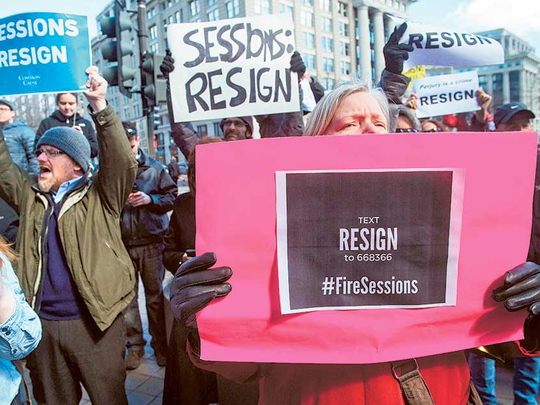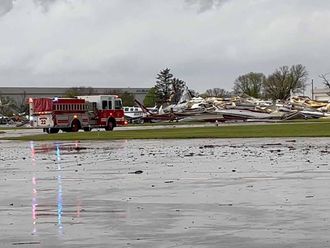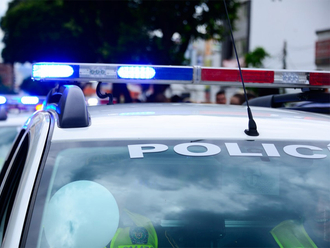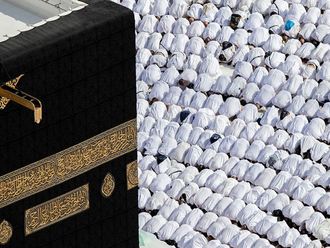
Moscow: Russia on Friday decried the uproar in the United States over Attorney General Jeff Sessions’ meetings with the Russian ambassador as a replay of McCarthyism, voicing regret over the lack of any substantive dialogue with Washington.
Sessions recused himself on Thursday from any investigation into communications between aides to President Donald Trump and Moscow following revelations that as senator, Sessions twice spoke with Ambassador Sergey Kislyak during the 2016 election campaign and failed to say so when pressed by Congress.
Russian Foreign Minister Sergey Lavrov argued that contacts with officials and lawmakers are part of any ambassador’s duties. He added that the pressure on Sessions “strongly resembles a witch hunt or the times of McCarthyism, which we thought were long over in the United States as a civilised country.”
In the 1950s, Sen. Joseph McCarthy led a hunt for purported communist infiltrators in the US government, often involving unfounded accusations.
Trump blamed Democrats for the controversy in a statement on Thursday night, “They lost the election and now, they have lost their grip on reality. The real story is all of the illegal leaks of classified and other information. It is a total witch hunt!”
At a news conference, Lavrov said Russia isn’t going to mimic the US, but added, “if we applied the same principle to Ambassador [John] Tefft’s activities in Russia and his contacts, it would have made quite a funny picture.”
In a sarcastic Facebook post, Russian Foreign Ministry spokeswoman Maria Zakharova said she met Tefft in the ministry’s lobby and warned him that he was putting himself in danger by meeting with Russian diplomats.
Asked to comment on the situation, President Vladimir Putin’s spokesman, Dmitry Peskov, cited the US leader: “We have nothing to add to the expansive definition given by President Trump.”
The Sessions case is widely seen in Moscow as part of efforts by Trump’s foes to block any possible rapprochement with Moscow. Russia-US ties plummeted to their lowest level since the Cold War times during Barack Obama’s presidency over the Ukrainian crisis, the war in Syria and other issues.
Trump had come into office hoping to mend ties with Russia, expressing admiration for Putin.
Russian lawmakers and political commentators said the allegations by US intelligence that Russia meddling in the election to help Trump defeat Hillary Clinton will likely continue to weigh over his administration and prevent it from launching a meaningful dialogue with the Kremlin any time soon.
In a conference call with reporters, Peskov lamented the lack of cooperation with the US on the Syrian settlement beyond the US diplomatic presence at peace talks in Kazakhstan’s capital of Astana that Russia and Turkey brokered earlier this year.
“Similarly, there has been no movement forward regarding cooperation in the fight against terrorism, which causes regret,” he said.
“Without waiting for these contacts to start, Russia has been consistently contributing to the fight against terrorism and scoring results,” Peskov said, pointing at the Russian military’s role in driving Daesh from the historic town of Palmyra.
Trump has repeatedly promised to cooperate with Russia in fighting the extremist group in Syria. Obama’s administration had ruled out such cooperation because of Moscow’s support for Syrian President Bashar Assad.
Other issues on the crowded Russian-US agenda leave little hope for any quick progress.
On Ukraine, any Trump move to soften the stance on Russia’s annexation of the Crimean Peninsula and its support for a separatist insurgency in eastern Ukraine would anger his Congressional foes and put him in an even more precarious position.
If Trump makes any attempt to ease the sanctions imposed on Russia by Obama’s administration could face strong resistance in Congress.
On the nuclear arms control, Trump’s intentions to modernise the US arsenals and his criticism of the 2010 New START nuclear arms treaty would potentially put him on a collision course with Moscow, which has signalled its desire to extend the deal after it expires in 2021.
But for now, the Kremlin is trying to show patience.
Peskov sought to play down Trump’s proposal to raise military spending by 9 per cent, saying that’s a domestic matter for Washington. “It would hardly concern us until a rise in spending upsets the existing balance of strategic deterrence,” he said. An early backer and key adviser for Trump’s campaign, Sessions said his staff recommended that he step aside from a probe.
“I feel I should not be involved in investigating a campaign I had a role in,” he said.
Sessions’ action followed revelations that he twice spoke with the Russian ambassador and didn’t say so when pressed, under oath, by Congress. Though he rejected any suggestion that he tried to mislead anyone, he did allow that he should have been more careful in his testimony.
“I should have slowed down and said, ‘But I did meet one Russian official a couple of times,’” he said.
The recusal, despite White House support for him, followed a chorus of demands that Sessions resolve the seeming contradiction between his two conversations with Moscow’s US envoy, Sergey Kislyak, and his statements to Congress in January that he had not communicated with Russians during the campaign. It carried echoes of a similar controversy involving retired Gen. Michael Flynn, who two weeks ago resigned as national security adviser after misleading White House officials about his own discussions with Kislyak.
The recusal removes Sessions from any involvement in examining potential Russian meddling in the election, which has dogged the Trump administration from the outset and figures to be an extraordinarily consequential matter for the department Sessions leads.
It means the attorney general should not receive any briefings on it and have no information to provide to Congress or the public. But Sessions’ decision to leave the matter in the hands of a top deputy may not cool demands that someone from outside the department provide a fully independent set of eyes.
Senate Minority Leader Chuck Schumer said a special prosecutor should be appointed to examine whether the federal investigation had been compromised by Sessions. House Minority Leader Nancy Pelosi, who had accused Sessions of “lying under oath,” repeated her call for his resignation after he recused himself and assailed his integrity.
“There must be an independent, bipartisan, outside commission to investigate the full extent of the Trump political, personal and financial connections to the Russians,” she said.











